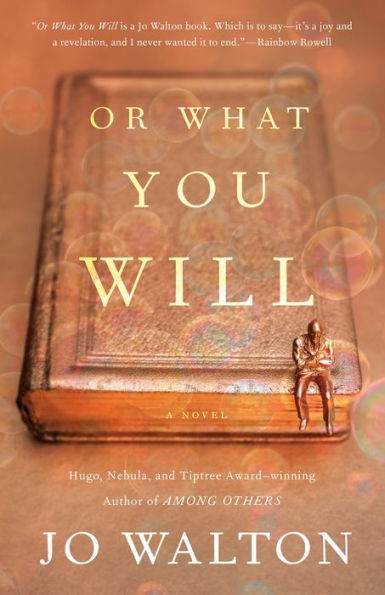Sylvia is a writer nearing the end of her life. Widowed with two daughters whom she loves but is distant with, with over thirty novels written to her name, and with one last book in her, she is making peace with her death, the end of it all. Only there’s someone in her life who won’t let her go; a character in her mind, who has been in nearly every story she’s written, a nameless man who has been with her almost every step of the way. And if she dies without putting him in a book for real, then he will die along with her, trapped in her skull. Thus begins Jo Walton’s Or What You Will, a book about books, about art, about writing and creation, and how in the act of creating, we work towards immortality.
This is a delightful, odd book, and I was by turns fascinated, enthralled, and a little confused, but ultimately happy with the twists and turns of the text. Walton combines many of her passions into this story, and you will find yourself at times going on digressions with her, as our unnamed narrator delves into the importance and meaning of various works of art, restaurants and ways of preparing food, the creative works of Renaissance Italy, as well as what can almost be described as Shakespearean fanfic, of characters from Twelfth Night and The Tempest finding new life after their endings in Sylvia’s last book she’s working on, a fictionalized version of Shakespeare’s Italy, where characters from both works interact, love, cherish, hate, and exist together. If you think there are layers to this story, don’t worry, there absolutely are. But while the meta-commentary can be a lot, and the digressions entertaining but seemingly without reason, the two combine artfully. For there is a third narrative here, and it’s of our unnamed protagonist inside Sylvia’s head telling us, the reader of this book, about Sylvia. In his gambit to immortalize her, he must tell us of her, as much as she finds it irksome when he does.
Buy the Book


Or What You Will
Through him we meet Sylvia, a writer of science fiction and fantasy, who has opinions on Worldcons, who is not close with her remaining family save one member, who has been through hell in a specific way, and found love in the climb out. Sylvia, who our unnamed protagonist loves and cherishes and is terrified of, for she is god to him, and can erase him with but a thought. Sylvia, who is dying and won’t tell him. Sylvia, who knows his plan to smuggle her into her own story, who knows he is doing so because he wants the same for himself, and humors him because why not? I found this one of the strongest aspects of the book itself, for after affairs of state in Thalia (the imagined Italy of Sylvia’s book), and after the lessons on art and architecture, after all that, is a writer who is trying to come to terms with her own end, and the beloved character of her imagination who won’t let her go. It develops into the beating heart of the novel, and soon, all these strands began to braid together in a final gambit to save the god who has meant so much to him, and in doing so, maybe save himself.
Or What You Will is the sort of book that may be doing a bit too much at any given time, but you’d never fault it for that. As a treatise on art, and the things we make, and the love we put into making them as we hope they will outlive us, Walton must. She must spin multiple plates, each of them rich moments of drama or education, or relationships, because this is the sort of book that demands that level of richness. If one is to pursue immortality, nothing can be left on the table; all the love one has for the world, for art, for pain, for family and friends, for story, it all must go into the cauldron and hope it is enough to summon you to the next world, to life everlasting. This richness is in service to knowing Sylvia, to understanding her wants and needs, knowing her pain and what she has survived to get here. And it works. By the end of the novel, whether it succeeds in the novel or not, you, the reader, know her. You, the reader, know Thalia and its magic, its inhabitants, the new lives of Duke Orsino and Caliban and Viola and Miranda, and yes, our unnamed narrator, who has worked so hard to imprint on you, the reader, the important of it all.
Because if you, the reader, know all this, it means you know Sylvia. And if you know Sylvia, reader, then she can never die. And neither can he. Across metatextual layers, Walton accomplishes what she sets out to do, and in some ways, it may not matter if it truly happens in the story. Sylvia and our narrator, through the act of reading, knowing, and empathy, become real. And that’s what matters. That is how they, and any of us, may live forever. Or What You Will may be at times quirky and rambling, but it truly captures the heart of what it means to make art, to tell stories, and why those things are so important. I can honestly say I’ve never read another novel like it, and I’m very glad, in reading it, to have had the chance to do my small part in contributing to immortality.
Or What You Will is available from Tor Books.
Martin Cahill is a contributor to Tor.com, as well as Book Riot and Strange Horizons. He has fiction forthcoming at Beneath Ceaseless Skies and Fireside Fiction. You can follow his musings on Twitter @McflyCahill90.










